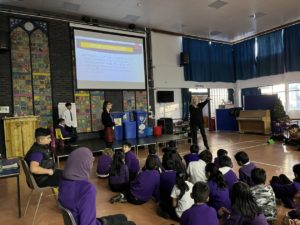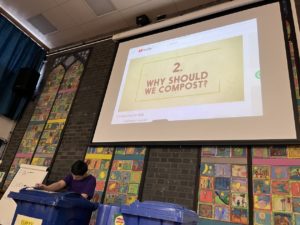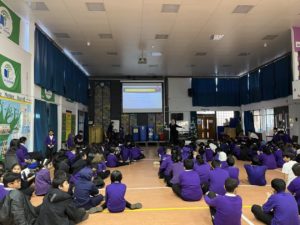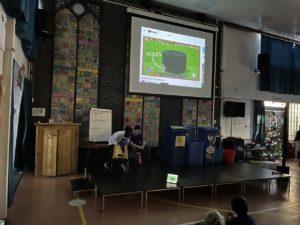Switch Off Fortnight Success
The Eco Committee used the calculator on The Pod’s website to calculate our carbon savings over Switch Off Fortnight and we found that by turning off lights and by switching off other electrical items when they didn’t need to be on, we saved 129 kg of CO2 from entering the earth’s atmosphere. We are proud of this achievement. We also saved 504 kWh s of electricity and 385 m 3 of gas. We worked out that if we keep up with our energy saving efforts for the rest of the school year, we could save 1393 kg of CO2.

Active Travel Grant Award Success
We found out last week that we have been awarded an Active Travel/ Outdoor Learning grant of £2700 to buy the high visibility clothing for the adults and children who will be taking part in our walking bus scheme in the new year. We are delighted to have been so lucky and this money will come in very useful to help get our walking bus going and reduce the numbers of cars in the morning and at 3 p.m. each day and so reduce our school’s carbon footprint.
Fighting Climate Change by Composting



 Last Week P 4-7 attended a Composting assembly in the school Hall, run by the Eco Committee. As we make our own compost in our Eco garden at St. Albert’s to use in growing fruit and vegetables, we wanted all our pupils to be aware of what composting is and why we should do it. Pupils watched a presentation about this subject and were reminded about the different bins we used for collecting and recycling food waste, crisp packets and plastic bottles, so they dispose of these items in the correct bins. At the end of the presentation, pupils took part in a quiz to earn points for their house groups, Earth, Wind or Fire. The Eco Committee added these points to their monthly totals. The pupils learned that if food waste isn’t composted and is sent to a landfill site, where it is dumped by the bin men, it releases greenhouse gases to the atmosphere such as Methane, which is 25 times more potent than carbon dioxide at contributing to global warming. They also learned that food scraps contain a lot of water and when combined with all the other rubbish in landfill sites, to create a toxic sludge. This sludge leaches into the soil and can get into groundwater and from there into rivers and lakes, harming the creatures that live there. They learned that the types of items that we want pupils to add to our compost bins are as follows:
Last Week P 4-7 attended a Composting assembly in the school Hall, run by the Eco Committee. As we make our own compost in our Eco garden at St. Albert’s to use in growing fruit and vegetables, we wanted all our pupils to be aware of what composting is and why we should do it. Pupils watched a presentation about this subject and were reminded about the different bins we used for collecting and recycling food waste, crisp packets and plastic bottles, so they dispose of these items in the correct bins. At the end of the presentation, pupils took part in a quiz to earn points for their house groups, Earth, Wind or Fire. The Eco Committee added these points to their monthly totals. The pupils learned that if food waste isn’t composted and is sent to a landfill site, where it is dumped by the bin men, it releases greenhouse gases to the atmosphere such as Methane, which is 25 times more potent than carbon dioxide at contributing to global warming. They also learned that food scraps contain a lot of water and when combined with all the other rubbish in landfill sites, to create a toxic sludge. This sludge leaches into the soil and can get into groundwater and from there into rivers and lakes, harming the creatures that live there. They learned that the types of items that we want pupils to add to our compost bins are as follows:
WHAT CAN GO IN OUR COMPOST BINS
- All fruit except citrus fruits like lemons, oranges, tangerines, limes and grapefruits.
- Twigs and sticks.
- Shredded or torn up paper.
- Grass cuttings (if you haven’t used weedkiller on the grass)
- Newspaper
- Corrugated cardboard boxes.
- Shredded toilet paper rolls
- Old cotton towels and sheets cut up
- Dead leaves
- Egg shells and egg cartons
- Brown paper shopping bags
The pupils were told that they can bring in some of these items to add to our three part composter in the Eco garden and in return, they will earn house points.
